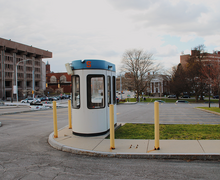Hacker: Long-term economic growth requires focus on the middle class
On July 24, in a speech at Knox College in Central Illinois, President Barack Obama said the highest priority for his second term is to rebuild the middle class — to “give every American a chance to get ahead in the 21st century.”
The ideas Obama presented were not “stale” and “tired,” as conservative pundits characterized them. As The New Yorker’s James Surowiecki said, the economy does not need a new fad diet. Long-term growth requires a commitment to policies that will ensure continued success — not a simple, quick fix like reducing taxes for the ultra-rich.
As average incomes stagnate, the price of goods and services rise and the price of higher education soars, the middle class gets stuck with the bill. A focus on bolstering the middle class does not mean a policy shift toward socialism.
Contrary to Republican mantra, policies promoting a fairer distribution of wealth do not dissuade people from attaining the American dream. Instead, these policies encourage them to do so by making upward social mobility attainable. Also, the rich will not, as argued by the political right, discontinue their current investing and spending levels if such policies are put in place.
As billionaire investor Warren Buffett wrote in a New York Times op-ed last November, “Let’s forget about the rich and ultra-rich going on strike and stuffing their ample funds under their mattresses if — gasp — capital gains rates and ordinary income rates are increased.”
Currently, the top 1 percent of Americans control 39 percent of the wealth. Until we can all walk in the shoes of a nurse making less than six figures a year, a teacher making even less or a high school graduate who had good grades but can’t afford college, this debate will be lost on those who have never had to endure similar circumstances.
Contrary to the economic theory of President Ronald Reagan — who began his political career as a New Deal-supporting Democrat — economic success for the wealthy does not benefit the rest of America. Wealth does not “trickle down,” as Republicans would have us believe.
Reaganomics has not improved the economic situation for the middle class. Neither has a reduction in the size of the federal government. Real median family incomes actually declined from 1979-1990, while the federal deficit tripled between 1980-1986 (Reagan held office from 1981-1989).
Reagan declared that those who disagreed with him on the debate about income inequality relied on a “discredited theory of social and class warfare” endorsed by the “politics of envy and division.” His assertion about envy hinges on a belief that “social and class warfare” is waged on the rich by the poor. But history shows us the opposite is true.
In the past 30 years, there have been major tax cuts for high-income Americans that, when compared to tax cuts for the middle class, are much larger as a proportion of income.
There has been a decline in real minimum wage, which remains well below the level of a livable income.
Unions have been demonized and disbanded in efforts driven by federal policy.
Since 1999, there has been critical deregulation of the financial industry. This deregulation took place even though high-income earners come disproportionally from the financial industry.
Obama was not shy about blaming Republicans and a grid-locked Congress for the current middle-class struggles. Obama said some of his plans rely on Congress while he will pursue others through the arm of the executive branch. He received resounding applause from the audience for the latter statement.
Economic growth for the long term requires a focus on the middle class. Obama’s remarks were directed at middle-class Americans who “worked hard, believed in the American dream,” but “felt like the odds were increasingly stacked against them.”
As the president stated, these people were right.
Michael Hacker is a senior political science major. His column appears weekly. He can be reached at mahacker@syr.edu and followed on Twitter at @mikeincuse.
Published on July 26, 2013 at 11:40 pm





